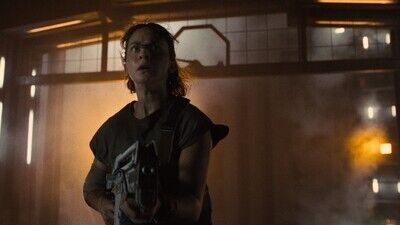There’s a definite sense that Alvarez is going back to the basics of Scott’s first film (which is a good thing). Once again, we’re introduced to a crew of interstellar blue-collar workers, led by a heroine who we know will be forced to mine veins of courage in herself that she didn’t know were there. In this case, it’s Rain Carradine (Cailee Spaeny of “Civil War”), a woman who believes that she’s reached her quota of hours in a mine on a planet that never gets sunshine, only to learn that the goalposts have been moved and she can’t get off of it for nearly another decade. While mourning her murdered future with her friends, she discovers that they have a plan to raid a space station that they’ve discovered floating above the planet. Get on board, take the cryo pods needed for the trip, and wake up in a new galaxy. What could go wrong? Weyland-Yutani always has a bad answer to that question.
Rain is joined closely on this journey by Andy (David Jonsson of “Rye Lane”), a synthetic whose objective is to care for Rain like a brother, and she cares for him as much in reverse. Most of the “Alien” films have used androids to ask some of their thorniest moral questions, and that’s the case again here in a number of twists that make Andy’s choices – the ones that should be guided by programming instead of human emotion – into some of the most interesting of the film. Without spoiling anything, Andy’s objective changes when the crew gets to the space station, and everyone discovers they’re not alone. Archie Renaux, Isabela Merced, Spike Fearn, and Aileen Wu star as the other travelers who will learn what a Facehugger is the hard way.
Eschewing the complex narratives of the prequels, “Romulus” has an almost charmingly direct plot: Five people and a synthetic find their way aboard a space station carrying some truly perfect killing machines and have to fight to escape. That’s about it. The thin plot allows Alvarez and co-writer Rodo Sayagues to focus on world-building and set pieces. The production design here by Naaman Marshall (who worked on “The Dark Knight” and “The Prestige”) is some of the best in a blockbuster sci-fi movie in a very long time. Like the original, there’s a sense that the space these characters occupy isn’t a sterile set but a place that has been lived – and died – in before. It’s hard to overstate the importance of that in a film like this. When we feel like the people in jeopardy are in real, three-dimensional places with histories of their own, we can feel like their plight is real too. Alvarez and his team have created a phenomenal setting on Romulus and Remus, the two halves of the space station on which almost all of this film takes place. It’s not quite as brilliantly claustrophobic as the first film, but it’s close enough, and indicative of how much Alvarez understands about why that film remains a masterpiece.

